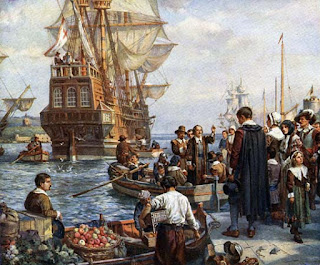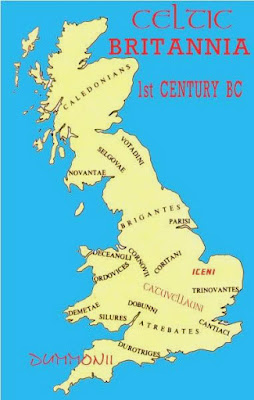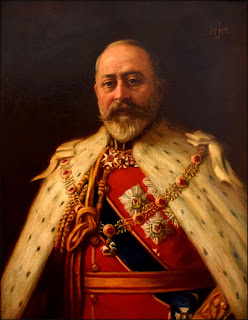First British Colonies
House of Burgesses
Representative assembly in colonial Virginia, which was the first elective governing body in a British overseas possession. The assembly was one division of the legislature established by Gov. George Yeardley at Jamestown, July 30, 1619; the other included the governor himself and a council, all appointed by the colonial proprietor (the Virginia Company). Because each Virginia settlement was entitled to elect two delegates, the original membership of the House of Burgesses was 22.
Pilgrim Fathers
 The Pilgrim
Fathers were a religious, English group founded in late 16th century
that, unhappy with the political and religious atmosphere in its country,
decided to travel to Netherlands and to America. They were met in puritan,
clandestine church because religious prosecutions were carried out.
The Pilgrim
Fathers were a religious, English group founded in late 16th century
that, unhappy with the political and religious atmosphere in its country,
decided to travel to Netherlands and to America. They were met in puritan,
clandestine church because religious prosecutions were carried out.
They
travelled on the Mayflower, the ship they used to arrive to the US.
Due to some ship problems, they had to return
twice to fix the ship. But finally, on September 6th in 1620 set
sail to the US and arrived on September 11th.
The ship
carried 102 people and the crew. They were the very first Anglo-saxons colons
who settled down in the current seashore of Massachusetts, creating the
Plymouth Colony.
Mayflower Compact
It was written in 1620 by the puritan men (41)
that were passengers of the Mayflower. It was written when they arrived to New
Plymouth. It was the first document of government of the colony. On the
compact, the colonists swore by God that they will do the best for the colony
according to certain laws.
They place
where they were going to had no law, so they created some rules in favour of
the convivence and the well-being of the inhabitants.
Puritanism
Puritanism is a religious movement in the 17th
century that was against the Pope, as the Puritans claimed that had been
retained after the religious settlement reached in the reign of Queen Elizabeth
I.
Puritans became noted in the 17th century for a
spirit of moral and religious earnestness that informed their whole way of
life, and they wanted through church reform to make their lifestyle the pattern
for the whole nation. Their efforts to transform the nation contributed both to
civil war in England and to the founding of colonies in America as working
models of the Puritan way of life.
First British Colonies

13
colonies where a group of colonies on the East coast of North
America (founded on the 17th and 18th centuries)
They had very similar political. A part of this
colonies, Britain had colonies in Florida, Canada and the Caribbean.
The 3 groups in which the Colonies where divided were:
- Proprietary Colonies: territories
granted by the Crown to one or two proprietors with full power of government. Before
the American Revolution War, there were just 3 propriety colonies: Maryland,
Delaware and Pennsylvania.
- Royal Colonies:
territory administered by a royal governor appointed by the British Crown. This
Colonies had a representative assembly elected by the people. The names of this
areas were: New Hampshire, New York, New Jersey, Virginia, Carolina (North and
South) and Georgia.
- Charter Colonies:
The colonies of Rhode Island, Connecticut, and
Massachusetts Bay were charter colonies. In a charter colony, Britain granted a
charter to the colonial government establishing the rules under which the
colony was to be governed.



Comentarios
Publicar un comentario